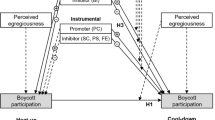Abstract
This paper reports three experiments with triadic or dyadic designs. The experiments include the moonlighting game in which first-mover actions can elicit positively or negatively reciprocal reactions from second movers. First movers can be motivated by trust in positive reciprocity or fear of negative reciprocity, in addition to unconditional other-regarding preferences. Second movers can be motivated by unconditional other-regarding preferences as well as positive or negative reciprocity. The experimental designs include control treatments that discriminate among actions with alternative motivations. Data from our three experiments and a fourth one are used to explore methodological questions, including the effects on behavioral hypothesis tests of within-subjects vs. across-subjects designs, single-blind vs. double-blind payoffs, random vs. dictator first-mover control treatments, and strategy responses vs. sequential play.
Similar content being viewed by others
References
Abbink, K., Irlenbusch, B., & Renner, E. (2000). The moonlighting game: An empirical study on reciprocity and retribution. Journal of Economic Behavior and Organization, 42, 265–277.
Andreoni, J., & Miller, J. (2002). Giving according to GARP: An experimental test of the rationality of altruism. Econometrica, 70, 737–753.
Berg, J., Dickhaut, J., & McCabe, K. (1995). Trust, reciprocity, and social history. Games and Economic Behavior, 10, 122–142.
Blount, S. (1995). When social outcomes aren’t fair: The effect of causal attributions on preferences. Organizational Behavior and Human Decision Processes, 63, 131–144.
Bohnet, I., & Hong, K. (2004). Status and distrust: The relevance of inequality and betrayal aversion. KSG Faculty Research Working Paper Series, John F. Kennedy School of Government, RWP04-041.
Bolton, G., Brandts, J. & Ockenfels, A. (1998). Measuring motivations for the reciprocal responses observed in a simple dilemma game. Experimental Economics, 1, 207–219.
Bolton, G.E., & Ockenfels, A. (2000). ERC: A theory of equity, reciprocity and competition. American Economic Review, 90, 166–193.
Charness, G. (2004). Attribution and reciprocity in an experimental labor market. Journal of Labor Economics, 22, 665–688.
Charness, G., & Rabin, M. (2002). Social preferences: Some simple tests and a new model. Quarterly Journal of Economics, 117, 817–869.
Cox, J. C. (2002). Trust, reciprocity, and other-regarding preferences: Groups vs. individuals and males vs. females. In R. Zwick & A. Rapoport (Eds.), Advances in experimental business research, Kluwer Academic Publishers.
Cox, J. C. (2000) Trust & reciprocity: Implications of game triads and social contexts. Discussion Paper, University of Arizona, revised 2003.
Cox, J. C. (2004). How to identify trust and reciprocity. Games and Economic Behavior, 46, 260–281.
Cox, J. C., & Deck, C. A. (2005). On the nature of reciprocal motives. Economic Inquiry, 43, 623–635.
Cox, J. C., & Deck, C. A. (2006). When are women more generous than men? Economic Inquiry, 44, 587–598.
Cox, J. C., Friedman, D., & Gjerstad, S. (in press). A tractable model of reciprocity and fairness. Games and Economic Behavior.
Cox, J. C., Friedman, D., & Sadiraj, V. (2006). Revealed altruism. E$x$CEN Working Paper Number 2006-09, Georgia State University.
Cox, J. C., & Sadiraj, V. (2004). Direct tests of models of social preferences and a new model. Unpublished paper, University of Arizona.
Dufwenberg, M., & Kirchsteiger, G. (2004). A theory of sequential reciprocity. Games and Economic Behavior,, 47, 268–298.
Falk, A., Fehr, E., & Fischbacher, U. (2000). Testing theories of fairness: Intentions matter. Working paper No. 65, Institute for Empirical Research in Economics, University of Zurich.
Fehr, E., & Schmidt, K. M. (1999). A theory of fairness, competition, and cooperation. Quarterly Journal of Economics, 114, 817–868.
Guttman, J. M. (2000). On the evolutionary stability of preferences for reciprocity. European Journal of Political Economy, 16, 31–50.
Levine, D. K. (1998). Modeling altruism and spitefulness in experiments. Review of Economic Dynamics, 1, 593–622.
McCabe, K., Rigdon, M., & Smith, V. L. (2003). Positive reciprocity and intentions in trust games. Journal of Economic Behavior and Organization, 52, 267–275.
Offerman, T. (2002). Hurting hurts more than helping helps: The role of the self-serving bias. European Economic Review, 46, 1423–1437.
Rabin, M. (1993). Incorporating fairness into game theory and economics. American Economic Review, 83, 1281–1302.
Sobel, J. (2005) Interdependent preferences and reciprocity. Journal of Economic Literature, 43, 392–436.
Author information
Authors and Affiliations
Corresponding author
Additional information
JEL Classification C70, C91, D63, D64
Electronic supplementary material
Rights and permissions
About this article
Cite this article
Cox, J.C., Sadiraj, K. & Sadiraj, V. Implications of trust, fear, and reciprocity for modeling economic behavior. Exp Econ 11, 1–24 (2008). https://doi.org/10.1007/s10683-006-9156-7
Revised:
Accepted:
Published:
Issue Date:
DOI: https://doi.org/10.1007/s10683-006-9156-7




